- Home
- Elif Shafak
Black Milk: On Writing, Motherhood, and the Harem Within Page 2
Black Milk: On Writing, Motherhood, and the Harem Within Read online
Page 2
Lucky dishwashers aside, my mother wasn’t the only one who didn’t expect me to get married. Apparently neither did my readers. As followers of my novels and essays, they had always been the first to understand what I felt. But this time they showed more shock than understanding. In letters, e-mails and postcards they expressed their surprise. Some even sent me clips of my earlier interviews where I had said, “Domestic bourgeois life? Forget it! It doesn’t suit me,” and, “I don’t think raising kids is my thing, but I believe I could make a good stepmother someday. You know, someone you can easily take to a football game or to a prom dress rehearsal.” Now, with a “gotcha” moment in their eyes, those smart readers with wry humor demanded to know what had changed.
There was only one answer I could give them: love.
I love my husband and always feel a strange calmness and happiness descend upon me when I am next to him. Yet there was a part of me that didn’t know how to deal with such tranquillity and wouldn’t or just couldn’t settle down into wedded bliss. Perhaps it was because I couldn’t settle down anywhere for too long. Having been born in Strasbourg, raised in Madrid, and resided in Ankara, Istanbul, Amman, Cologne, Boston, Michigan and Arizona, I had been living out of a suitcase all my life—certain that I could stay anywhere and everywhere on this planet as long as I didn’t have to put down roots. As the only child of a single mother, I had accepted one truth about human nature early on that I saw others trying to resist in vain: that loneliness was an inseparable part of being human.
I liked loneliness. I cherished it. I knew people who would go nuts if they were alone for too many hours. It was the opposite with me. I would go nuts if I had to be in the company of other people all the time. I would miss my privacy.
My vocation as a novelist thrives upon solitude. In almost all areas of art one has to work with other people during the creative process. Even the most egotistical of film directors has to be good at harmonizing his energy with that of others, learning to function as a team. So, too, fashion designers, actors, dancers, playwrights, singers and musicians.
But not fiction writers. For weeks, months and sometimes years on end, we retreat into the novels we write; we stay inside that imaginary cocoon surrounded by imaginary characters, writing destinies, thinking we are God. As we develop plots, add sudden twists, create and destroy characters, we can easily end up presuming we are the center of the world. Self-absorption and an inflated ego are the two most harmful side effects of our profession. That is why we make poor lovers and even poorer wives and husbands. Writers are primarily asocial creatures—though we can easily forget that with a bit of fame and success. The novel is the loneliest form of art, as Walter Benjamin once said.
During the period after my wedding I was teaching in Arizona and every few weeks I would hop on a plane for a twenty-six-hour flight (with connections) to be with my husband and friends back in the crazy, chaotic, colorful rhythm of Istanbul, and then I would return to Arizona to retreat into my desert solitude.
The first thing you feel when you walk out of Tucson International Airport is the heat wave, rising from the depths of the earth, licking your face with invisible flames. The first thing you feel when you walk out of Ataturk International Airport in Istanbul is the wave of noise, a loud jumble of cars honking, motorcycles rumbling, jackhammers drilling and people talking, yelling and whistling, all at the same time.
Heat wave, noise wave. Back and forth. This went on for almost two years. Then one day, I learned I was pregnant.
I hadn’t known I wanted to become a mother and it took me by surprise. But I wanted to have this baby. It was as if another part of me—a domestic, nurturing, maternal side—was now rebelling against the part that had dominated all those years. The insurgent forces of motherhood infiltrated the tiny little villages south of my personality with amazing speed and agility, but the vested powers sitting in the capital were still holding strong.
Yet, I didn’t want to lose the wandering, independent, carefree spirit that I was. Inside my head there were six voices speaking all at once. Hence I entered this pregnancy with mixed feelings, as if I were being dragged toward the unknown by an undercurrent that was stronger than my heart. It didn’t help that I was put on trial during the final stages of my pregnancy due to the sentences a few of my Armenian fictional characters uttered in my novel The Bastard of Istanbul. By coincidence the trial was set for the day after my delivery. Although I was acquitted at the first hearing, and the experience had no bearing on my subsequent depression, those tense days added to the challenges of the entire year.
I gave birth in September 2006, the most beautiful month of the year in Istanbul. Happy and blessed as I felt, I was also perplexed and unprepared. We rented a charming, quiet house on the islands where I could nurse and write. That was the plan. But it turned out I could do neither. My milk wasn’t sufficient, and each time I attempted to go back into the world of fiction and start a new novel, I found myself staring at a blank page with growing unease. That had never happened to me before. I had never run out of stories. I had never experienced writer’s block or anything that came close to it. For the first time in my adult life, as hard as I tried, words wouldn’t speak to me.
Suddenly I was seized by the fear that something had irreversibly changed in me and I would never be the same again. A wave of panic surged through me. I started to think that now that I had become a mother and housewife, I would not be able to write fiction anymore. Like an old dusty carpet, my old Self was pulled out from under my feet.
Books had been my best friend since the day I learned how to read and write. Books had saved me. I had been an introverted child to the point of communicating with colored crayons and apologizing to objects when I bumped into them. Stories had given me a sense of continuity, center and coherence—the three Cs that I otherwise sorely lacked. I breathed letters, drank words and lived stories, confident that I could twist and twirl language in a passionate tango.
All this time my writing had filled the one suitcase I took with me wherever I went. Fiction was the invisible glue that held my different facets together, and when it was no longer with me, all my pieces fell apart. Without it, the world seemed like a melancholic place, infinitely sad. Colors that had looked bright and cheerful were now dull. Nothing was enough anymore. Nothing seemed familiar. I, who had traveled across continents, easily finding home in so many places, could not find the strength or will to go out into the street. My skin got so thin everything started to hurt me. The sun was too hot, the wind too harsh and the night too dark. I was full of anxiety and apprehension. Before I knew it, I had plunged into a severe postpartum depression.
After weeks of watching me cry, my maternal grandmother—a gentle but mighty woman with abundant superstitions—held my hand and whispered, in a voice as soft as velvet, “My dear child, you’ve got to pull yourself together. Don’t you know that with every tear a new mother sheds, her milk turns sour?”
I didn’t know that.
I found myself thinking about this image. What would happen if my milk curdled? Would it darken, acquiring a thick and murky texture? The thought of this not only alarmed me but also made me feel guilty. The more I tried not to cry the more I felt like doing so. How come every other woman I knew adapted to motherhood so easily, but I couldn’t? I wanted to breast-feed my child as long and best as I could. The image of spoiling milk nagged at me during the day, and attacked me in my dreams.
Then one morning, after months of depression, seclusion and unsuccessful treatment, I woke up with an urge to write again and sat at my desk. It was quiet, except for a few fishing boats in the distance and the baby sleeping in her cradle. There was a scent of jasmine in the air and the sky over the Bosphorus was a blue so pale that it had almost no color. Suddenly I had this most soothing realization that everything was okay and had always been so. As Rumi said, the night contained the day. We could start our lives over, anytime and anywhere.
It was okay that I had pan
icked and could not stop crying. It was okay that I had feared I couldn’t manage writing and motherhood at the same time. Had my milk not been as white as snow, that, too, would be okay. If I started to write about the experience, I could turn my blackened milk into ink, and as writing had always had a magical healing effect on my soul, I could perhaps inch my way out of this depression.
That same day, I put the baby in her pram and walked out of the house into the bustling street. At first cautiously, then more daringly, I started talking to other women about their postpartum experiences. I was surprised to hear how many of them had gone through a similar emotional turbulence. Why didn’t we know more about this? I had always been told that all women jump for joy as soon as they hold their babies in their arms. No one said that while jumping some of us hit our heads on the ceiling, making us temporarily dizzy.
As I kept writing Black Milk I had myriad moving conversations with women of all ages and professions. Slowly and steadily, it dawned on me that I wasn’t alone. That helped a lot. It was ironic for someone who had always taken pride in her ability to be alone to seek solace in numbers, but I chose not to dwell on that. The simple fact is that postpartum depression is far more common than we, as a society, would want to believe.
Interestingly, women knew about this in the old days. Our great-grandmothers were aware of all kinds of postpartum instability and therefore better prepared. They passed on their knowledge to their daughters and granddaughters. But today we are so disconnected from the past that we have no real access to this wisdom. We are modern women. When we are weary and bruised inside we hide the signs with the latest makeup techniques. We think we can give birth one day and go on with our lives the next. Some of us do, of course. The trouble is, others simply cannot.
In Turkey, elderly women believe that during the forty days following the birth of a baby, a new mother should be kept in the company of her loved ones. If she were to be left alone, even for a moment, she might become susceptible to the attacks of the djinni—falling prey to a deluge of worries, anxieties and fears. That is why traditional families still decorate the bed of a new mother with scarlet ribbons and scatter sanctified poppy seeds around the room to ward off any supernatural powers looming in the air.
I am not trying to argue here that we should be guided by a bundle of superstitions or expect health care to cover decorations of garlic strings and evil-eye beads in maternity wards. What I am saying is that women of premodern times—through their old wives’ tales, traditions and beliefs—recognized an essential fact that we are not that good at acknowledging: Throughout her life, a woman goes through several major stages, and the transition from one to the next might not be easy. She might require additional help, support and guidance before she starts living fully in the present again. As a woman moves from one day to the next, struggling, problem solving, organizing and controlling, there are times when the machine of her body may falter. It is this simple and age-old wisdom that we have lost touch with in our determination to be successful, strong and always perfect.
Mrs. Weakness is not a popular woman among the members of our generation. Nobody knows where she is now, but there are rumors that she has been sent into exile to an island in the Pacific or a village on the outskirts of the Himalayas. We have all heard of her, but it is forbidden to say her name aloud. At our workplace, school or home, whenever we hear someone talk about her we flinch, fearing the consequences. While she is not exactly on the Interpol List of the Most Wanted, nobody wants to be associated with her.
None of this is to deny that motherhood is one of the greatest gifts in life. It molds the heart like clay, bringing one in tune with the rhythm of the universe. There is a reason why countless women say motherhood was the best thing that happened to them. I agree with that from the bottom of my soul.
Nevertheless, a woman does not become a mother the very minute she gives birth. It is a learning process, and for some it simply takes longer than for others. There are those, like myself, who find themselves shaken to the core by the entire experience. I am not claiming that the transition into motherhood is more difficult for creative people, as I have seen women from all walks of life undergo similar trouble, albeit in varying degrees. No woman is absolutely immune to postpartum blues. Perhaps the strongest and most confident among us are the ones who are, in fact, most vulnerable. Interestingly, this psychological roller coaster can happen just as easily with the second, the third or even the sixth pregnancy as with the first.
After all, pregnancies are like snowflakes. No two are exactly alike.
PART ONE
Life before Marriage
Signs
It is noontime in Istanbul. I am on the steamboat Gypsy, named after the way it dances in the blue waters, ferrying passengers between the islands and the mainland. Young lovers stealing kisses, high school students skipping class, office workers prolonging their lunch break, photographers lugging their cameras, salesmen backpacking their wares, tourists being tourists . . . Somehow people from all walks of life seem to have found themselves in this nutshell of a vessel that is swaying from side to side. I am squashed in a corner. With books on my lap, I am sitting between an overweight woman and a well-groomed, elderly gentleman. Having completed an interview for a literary magazine on one of the islands, I am on the return route. The city girl is going home. Alone.
Shortly after the boat leaves port, I realize I have forgotten my notebook at the place where I did the interview. Suddenly, I feel bad. Why do I always go around forgetting something or other? Umbrellas, cell phones, vitamins, mascaras, lipsticks, hair bands, gloves . . . I forget half-eaten sandwiches that I’ve put aside for a few minutes, and I forget, in public toilets, my silver rings after I’ve taken them off to wash my hands. Once I even forgot a glass bowl with two turtles in it, a birthday present from a dear friend. As I couldn’t bring myself to confess to my friend that I had lost her present the very day she had given it to me, during the weeks that followed, every time she asked me about the turtles, I made up stories.
“Oh, they are doing great, gorging on my cyclamens, gaining weight.”
Then I said: “You know, the other day one of the turtles sneaked out of the bowl without my noticing. I looked everywhere but couldn’t find it. Then later, when I turned on the reading lamp, there it was. Sitting comfortably on the bulb! The shadow it cast on the wall looked like a monster.”
I went on inventing the adventures of my two turtles until one day my friend looked me in the eye and asked me to please stop. Her voice suddenly dwindled into a whisper; she told me she had a confession to make.
“I need to get this off my chest,” she said. “When I first bought the turtles I had serious doubts whether you would take good care of them. But you proved me wrong. You are doing such a great job that I think I owe you an apology.”
I bit my lip and stood still, not breathing. That was it. After that I couldn’t fabricate turtle stories and a few days later it was my turn to make a confession. I told my friend that she did not owe me an apology as it was I who had to apologize, not once but twice, for my carelessness and for my deception. I then explained to her that her turtles had never made it to my house.
“You know, I had a hunch,” she said after a long, awkward silence. “When you told me the turtles were nibbling sunflower seeds out of your hands, I wondered if you were confusing them with caged canaries.”
To my relief she broke into a laugh and I joined her. We made fun of my sloppiness. I didn’t really mind. Other than the embarrassment of losing the gift, the incident induced no further self-criticism in my soul. What difference did it make if I was a good caretaker or not? After all, turtles weren’t babies.
Suddenly the steamboat rocks, like a giant stretching out of sleep. All of us passengers live through a moment of panic. Lips move restlessly, hands reach for something to grab. Far ahead there is a Russian tanker creating massive waves. We watch the tanker uneasily, and yet as soon as the waves smooth out i
nto ripples, we end our prayers, loosen our fists and sink back into lethargy.
But I have other concerns on my mind. Since realizing I no longer had my notebook, I have been thinking of nothing but writing. I guess I have a tendency to make life more difficult for myself. If I actually had paper, I might not have such a strong urge to take notes at this instant. But because I don’t have paper, I must write. I furiously dig in my bag and empty everything onto my lap, but I can’t find even a receipt to write on the back of.
I don’t know why I am fretting. There is an idea buzzing in my head but just what it is I cannot tell until I put it in writing. Many people, including many writers, prefer to mull things over in detail before jotting them down, but I am the opposite. In order to understand the thoughts churning in my mind, I have to first see them in the form of letters. I know I have an idea now, but I need to put pen to paper to learn what it is. And for that I need paper.
I glance left and right. The woman next to me doesn’t look like she could be of help. There appears to be a ton of knickknacks in her shopping bags, but I doubt there is a notebook among them. Now that I have paid attention to her, I realize how young she actually is. She seems to be around twenty-five. It is her extra weight that makes her appear, at first glance, ten to fifteen years older. She is wearing a balloon-sleeved, puffy-skirted azure dress—as if she has just walked out of a 1930s movie and got on a steamboat in Istanbul. Her hair, a wavy dark brown, is cut at shoulder length and newly combed. A pair of golden earrings dangles from her ears. Her toenails, visible through her open shoes, are painted a vivid red. Though the buttons of her dress look as though they are about to burst, she doesn’t seem to mind. She has accepted the largeness of her breasts as a blessing and exhibits them as a favor to all mankind without discrimination. A woman who is proud of her womanhood and all the more womanly in her pride, she exudes a strong, bold and magnetic femininity.

 Black Milk: On Writing, Motherhood, and the Harem Within
Black Milk: On Writing, Motherhood, and the Harem Within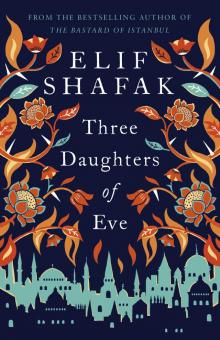 Three Daughters of Eve
Three Daughters of Eve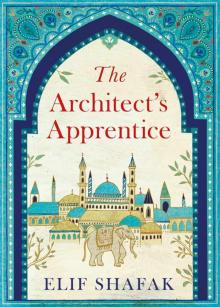 The Architect's Apprentice
The Architect's Apprentice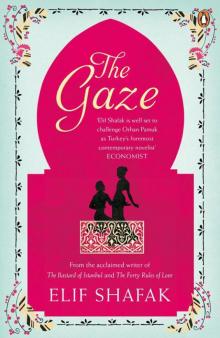 The Gaze
The Gaze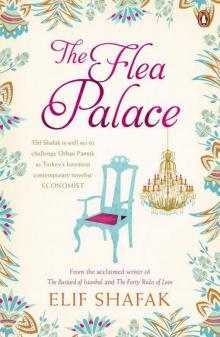 The Flea Palace
The Flea Palace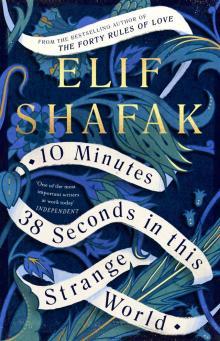 10 Minutes 38 Seconds in this Strange World
10 Minutes 38 Seconds in this Strange World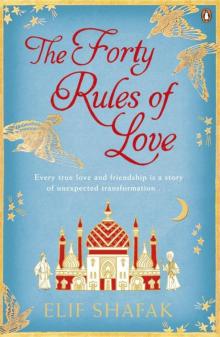 The Forty Rules of Love
The Forty Rules of Love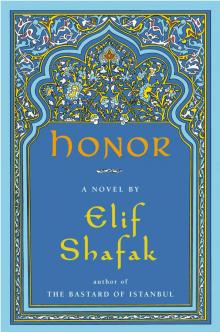 Honor
Honor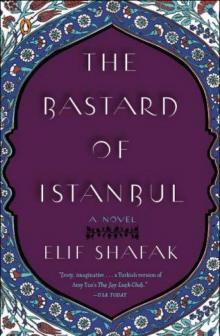 The Bastard of Istanbul
The Bastard of Istanbul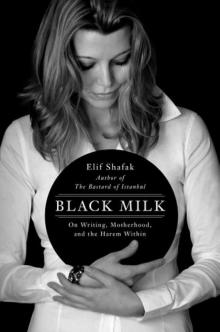 Black Milk
Black Milk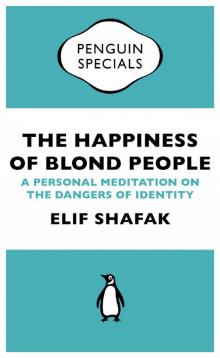 The Happiness of Blond People (Penguin Specials)
The Happiness of Blond People (Penguin Specials)